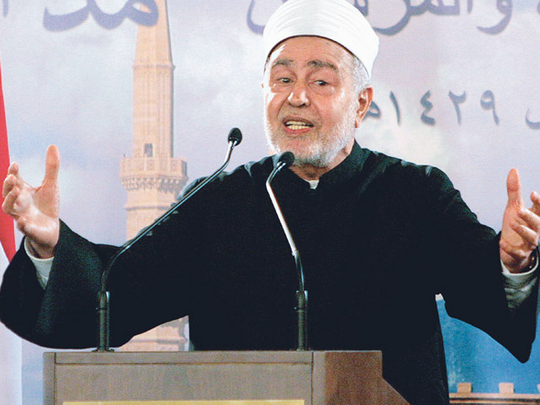
Cairo: Top Egyptian mufti and head of Al Azhar, Mohammad Syed Tantawi, who died yesterday, held controversial views on a wide range of subjects, such as the Islamic veil in France, abortion, suicide bombings and women imams.
Late last year, Tantawi caused a stir in Egypt when he banned the niqab (a full-face veil) at woman-only institutions of Al Azhar, which is one of the Sunni world's most influential seats of learning.
At the time, Tantawi said that the niqab "is a traditional costume, which has nothing to do with Islam". A few weeks later, a similar ban was imposed by authorities at Egypt's public universities, much to the protest of Islamists and human rights activists.
Meeting with Peres
Two years ago, Tantawi, often criticised as a pro-government cleric, came under fire in Egypt when he was shown in pictures shaking hands with Israeli President Shimon Peres at a conference on inter-faith dialogue in Geneva. An embattled Tantawi said he had not recognised Peres.
Egypt was the first Arab country to sign a peace treaty with Israel in 1979. But anti-Israel feelings run high in the Arab world's most populous country.
In December 2003, Tantawi had also angered many Muslims when he said that the French government had the right to ban the hijab (a headscarf worn by Muslim women) in schools.
In 1997, he lent his blessings to a controversial campaign launched by the Egyptian authorities against female genital mutilation. He said the centuries-old practice was un-Islamic. "The Ulema (theologians) of Islam are unanimous in agreeing that female circumcision has nothing to do with Islam," he was quoted as saying.
In 2001, he drew massive criticisms for condemning suicide bombings as being against Islam. His fatwa was announced as the Palestinians were engaged in their intifada against Israeli occupiers with support from Egyptians.
In January, a council of leading Muslim clerics, directed by Tantawi, supported the highly unpopular government's construction of an underground barrier along the border with Gaza to impede tunnelling by Palestinian smugglers.
Construction of the barrier drew angry condemnation from the Hamas rulers of the Gaza Strip, which relies on the tunnels for food and fuel, as well as the weapons and other contraband the barrier is designed to stop.
In 2007, he urged Egyptian Muslims to vote on a series of unpopular constitutional amendments put forward by the ruling National Democratic Party and boycotted by many. During his years as Grand Mufti of Egypt, Tantawi was no stranger to controversy either. He issued a contentious fatwa ruling that the interest rates offered by banks to depositors comply with the Islamic Sharia.
Meanwhile Mohammad Wasel, Tantawi's deputy, is expected to take over Al Azhar, temporarily until Egyptian President Hosni Mubarak appoints a new head.
Defender of virtues
Mohammad Syed Tantawi, who has three children, was born in 1928 in the village of Salim in Sohag province, about 290km south of the capital, Cairo.
In 1966 he graduated from the faculty of theology at Al Azhar, the 10th century university that has trained the majority of Sunni clerics from Africa and Asia.
"Since God created people there has been a battle between right and wrong, between virtues and vices," he once said in an interview with an Egyptian newspaper.
"Our job as responsible parties is to defend right and virtues, and to answer whoever deprecates Islam — in a convincing and wise way, because Islam is a religion that gives every human being what is due to him."
Al Azhar, a millennium-old university and mosque complex, is widely regarded as one of the main seats of Islamic learning and the most prominent Sunni institutions in the world. It is tasked with propagating Islamic culture and religion around the world.
The softly spoken cleric with a trim white beard was always seen wearing a traditional Azharite white turban.












